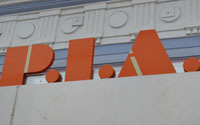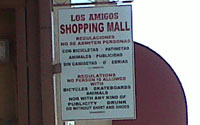Safety Ambassador on the Job
Francis James spends most of his days at the corner of Flower and Jefferson. His job as a Metro safety ambassador is to make sure pedestrians are safe when trains on the Blue Line pass through.
This area is showing definite promise with regards to street art and muralism, but also shown by the many screen printing and design stores popping up, other forms of art are also being explored. More than anything, this area is demonstrating a real dedication to arts education, not only in schools, but also through other venues like the Papillion Institute of Art and the St. Francis Center.
For over twenty years Los Amigos Shopping Mall has embraced cultural and ethnic diversity. The outdoor mall is home to over 100 shops and restaurants catering to the South Los Angeles community. The shops range from a tattoo parlor, to religious gift shops selling framed light-up Last Supper paintings. The mall has been able to endure tough economic times due to the variety of shops and services it provides.
The Coalition for Responsible Community Development is a neighborhood-based community development corporation that operates in our region. Part of their housing program includes developing permanent supportive housing for low-income youths ages 16-24. What really stands about CRCD is their commitment to helping out some of the most at risk young adults, those coming out of the foster care system.
By Braden Holly
Richard Maldonado was sitting with a coworker in a broken-down bus on Figueroa Street while the two of them waited for a mechanic to arrive and get the bus running again. After working for the Los Angeles County Metropolitan Transportation Authority for almost 20 years, Maldonado takes it all in stride.
Maldonado, 54, started working for Metro in 1994 as a bus driver and has since become a supervisor responsible for the training of new bus drivers.
“I started at Metro when I was about 36-years-old,” said Maldonado. “When I started in 1994 I didn’t know anything about driving a bus.”
Now a training supervisor, Maldonado rides with new drivers to ensure that they are operating the buses properly and driving safely. Maldonado’s coworker, who declined to be interviewed, was returning after taking a hiatus from work to deal with a medical problem. Maldonado was simply accompanying her to make sure she got back in the swing of things without difficulty.
“I am pretty close to a driver’s education instructor; they come to us on Monday and we put them behind the wheel on Thursday,” said Maldonado as he smiled. “In 2005 I obtained a Class A license, so I can also train mechanics who are employed with our company.”
Maldonado also said that working for Metro has taught him to deal with people in a positive manner, even if passengers don’t always make it easy.
“The people on the bus do have issues, and we have to be patient with that,” Maldonado said. “I’ve had a few instances but nothing that caused me to be panicky. I’m a pretty mellow guy and I understand that there are difficulties in the world; as a trainer I try to instill that in any of the new people who come through here: to show patience, understanding, respect and dignity.”
Maldonado also credits Metro with making him a much safer driver.
“One of the best things that has happened to me is that my driving skills have been enhanced to the point where I really understand defensive driving,” said Maldonado of his training and education with Metro.
Though he has had the time to do this interview while waiting in a broken-down bus for a mechanic to arrive, Maldonado says that a breakdown of this kind won’t affect the passengers who depend upon public transportation.
“If I am an operator and we can’t get a bus to start, a mechanic will bring me a bus,” Maldonado said. “I take that bus and continue with service to the public while the mechanic stays and works on it in place or gets it towed.”
According to Maldonado, the system is very efficient, and the longest he ever had to wait for a mechanic in his nine years as a bus operator was less than an hour. The Metro lines are broken-down into sections with mechanics located in each section and roving mechanics as well.
“It doesn’t interrupt the service to the public,” said Maldonado, “They just take care of the mechanical problem and the public never knows about it."
Though Metro is constantly working to maintain the buses, they are heavily used, and breakdowns are sometimes inevitable. Because breakdowns can’t be avoided all of the time, a streamlined and efficient means of handling breakdowns on the bus lines is of the utmost importance.
“The buses run all day, it’s a 24-hour service depending on which line you’re talking about, and one tank of gas will pretty much run for 24 hours,” said Maldonado when asked about how much wear-and-tear the buses experience before they are retired. “They go over 100,000 miles and get rebuilt and then they go another 100,000 miles and get rebuilt again. They use them for quite a bit, and some of the ones we are still using have been going for 20 years or more."
The bus in which this interview took place was one of the newer ones, according to Maldonado, and was about eight years old.
“Hopefully we won’t be here too long,” said Maldonado, “We’ll get a jumpstart and be on our way to pick up some people on Alvarado for about an hour or so and then we’ll head on back.”







